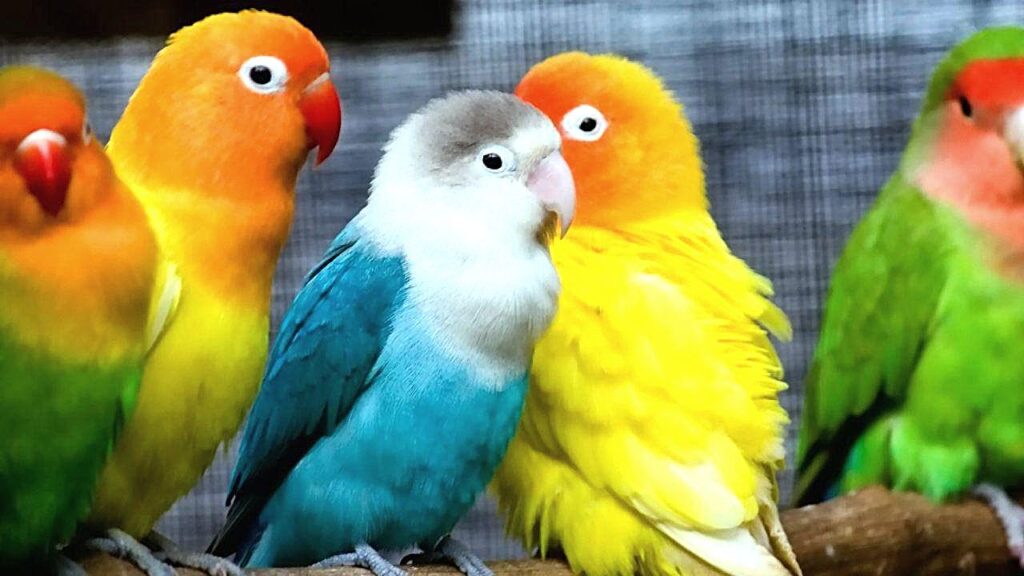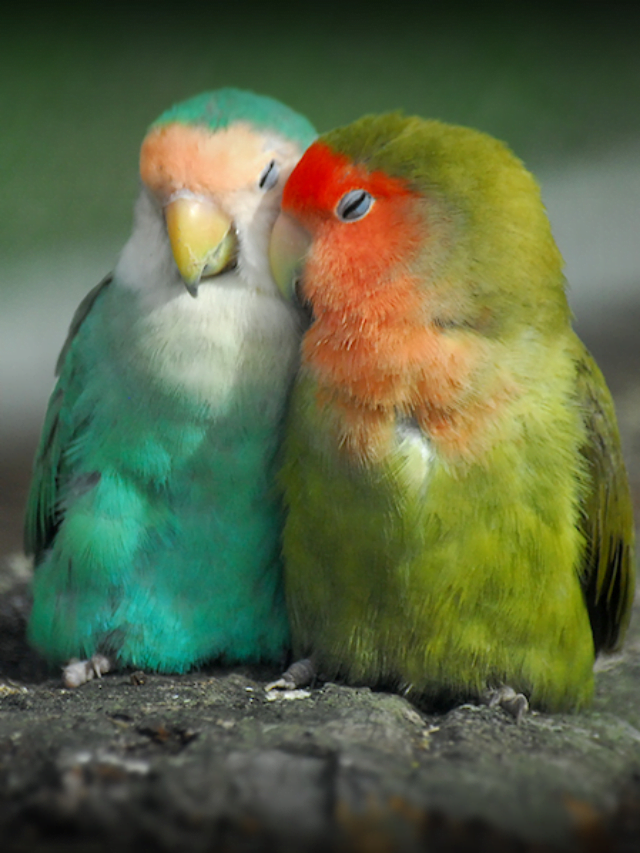Table of Contents
As a lovebird owner myself (I got four of them!), I understand the importance of providing the best care for your pet lovebirds. In this article, I will try to note down my own experience of lovebird care, covering their habitat, diet, health, and more.
Love birds are beautiful, social, and intelligent birds that can bring immense joy and companionship into your life. However, they require specific care to thrive and lead a happy, healthy life. In this guide, we will explore various aspects of love bird care, including cage setup, feeding, veterinary care, training, and socialization. So let’s dive in and discover how to become an expert in love bird care!
Pro tip: Maybe your cute little lovebird is not a kid anymore but an old lady. Use this bird age calculator to estimate their longevity and take proper care.
Habitat and Environment
Creating the perfect habitat for your lovebirds is crucial for their overall well-being. Here are some key considerations:
Cage Setup
Select a spacious cage that allows your lovebirds to move around freely. The cage should be made of sturdy materials with narrow bar spacing to prevent any escapes. Include perches, toys, and swings to stimulate their physical and mental activity. A minimum cage size of 24x18x24 inches is recommended for a single pair of love birds.
Note: Lovebirds try to remove the door of the cage. So use a small lock or string. Pro tip: I use a paper clip (LOL).
Temperature and Lighting
Lovebirds remain comfortable in temperatures ranging from 20°C to 35°C. But this year was a hot scorching summer in India. So I had to bathe them every day and used water spray occasionally.
Also, during the afternoon, I used to keep them inside my air-conditioned rooms. I don’t want to let the poor kids suffer.
Ensure they are not exposed to drafts or direct sunlight. Provide a full-spectrum light to mimic natural daylight, which helps maintain their circadian rhythm.
Bedding and Nesting
Line the cage floor with soft bedding like paper or wood shavings. Lovebirds also enjoy having a cozy nesting box or hut in their cage, where they can retreat and feel secure.

Diet and Nutrition
A well-balanced diet is essential for the health and vitality of your lovebirds. Here’s what you should include in their daily meals:
Pellets and Seeds
Offer a high-quality pellet mix specifically formulated for lovebirds as the main part of their diet. Supplement this with a small portion of seeds, such as millet and sunflower seeds, which serve as a tasty treat.
Fresh Fruits and Vegetables
Introduce a variety of fresh fruits and vegetables into their diet. Some recommended options include apples, oranges, carrots, broccoli, and leafy greens. Wash the produce thoroughly and cut them into small, manageable pieces.
Hydration
Always provide fresh, clean water for your lovebirds. Change the water daily and ensure that it is easily accessible within the cage.
Socialization and Interaction
Lovebirds are highly social birds that thrive on companionship and interaction. Here are some tips for keeping them happy:

Pair Bonding
Consider keeping lovebirds in pairs or small groups. They form strong bonds with their mates and enjoy the company of their kind. Ensure that the cage is spacious enough to accommodate multiple lovebirds comfortably.
Playtime and Training
Engage your lovebirds in regular playtime outside the cage. Offer toys, puzzles, and interactive games to keep them mentally stimulated. Train them using positive reinforcement techniques to perform tricks and commands, which strengthens the bond between you and your feathered friends.
Health and Veterinary Care
Maintaining your lovebirds’ health is of utmost importance. Here are a few health-related guidelines:
Regular Check-ups
Schedule regular visits to an avian veterinarian for thorough check-ups. A professional will examine your lovebirds, provide necessary vaccinations, and address any health concerns.
Signs of Illness
Be vigilant for any signs of illness, such as changes in behaviour, decreased appetite, abnormal droppings, or respiratory problems. Contact a veterinarian immediately if you notice any unusual symptoms.
Grooming and Hygiene
Trim your lovebirds’ wings regularly to prevent accidental escapes. Provide them with a shallow dish of water for bathing, as lovebirds enjoy splashing around to keep their feathers clean and healthy.
Common Lovebird Behaviors
Understanding your lovebirds’ behaviours can help you provide appropriate care and address their needs effectively. Here are some common traits you may observe;
Vocalizations
My lovebirds shout a lot! They are attention seekers, and whenever they are kept alone without someone attending to them, they get agitated and scream at the highest pitch. Usually, the shout starts early in the morning. Sometimes it irritates me, and I cover the cage with a towel, and voila, the naughty birds stop shouting immediately.
Nibbling and Chewing
Lovebirds have strong beaks and enjoy nibbling and chewing on various objects. Provide them with bird-safe toys and materials like wooden blocks, ropes, and shreddable toys to satisfy their natural chewing instincts.
Conclusion
By following this comprehensive guide, you are equipped with the knowledge and understanding to provide optimal care for your lovebirds. From creating a suitable habitat to ensuring a balanced diet and promoting socialization, your lovebirds will thrive under your attentive care. Remember to observe their behaviours, maintain their health through regular veterinary check-ups, and enjoy the delightful companionship of these charming and affectionate birds.
How often should I clean the cage?
It is recommended to clean the cage and accessories every week. Regular cleaning helps maintain a hygienic environment and prevents the buildup of bacteria.
Can love birds be potty trained?
Love birds can be trained to a certain extent to minimize messes. Providing a designated area with absorbent bedding or using potty training techniques can help.




